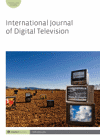-
f Not the Apocalypse: Television Futures in the Digital Age
- Source: International Journal of Digital Television, Volume 1, Issue 1, Jan 2010, p. 31 - 50
-
- 01 Jan 2010
Abstract
This article begins by challenging what we describe as a developing analytical orthodoxy around the development of digital television, an orthodoxy which produces a story about the end of television. We argue that the social practice of television is far from over, and that it is changing in ways which reflect continuities with past practices as well as the effects of emerging economic, technological and cultural formations of production and use. The article draws upon our research into some Asian television markets (part of a collaborative international research project on post-broadcast television) in order to highlight the contingency of these changes and thus the importance of a highly nuanced, locally grounded, and culturally informed analysis of what is becoming of television in the digital age. The article also draws attention to the current difficulties confronting such comparative analysis, in that we lack a common, simple and comprehensive means of measuring, benchmarking and mapping the various formations of what we still call television around the globe.


